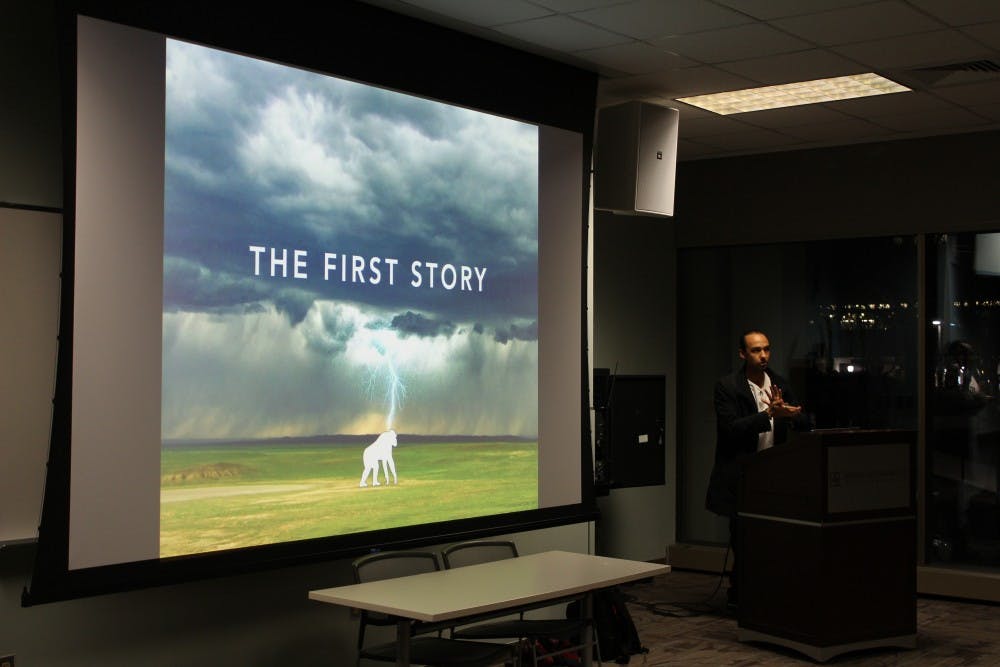Climate change is a big and looming issue, but it doesn’t have to be so intimidating. The (Com)Post is The Eagle’s new sustainability series that breaks down topics in eco-friendly living in a fresh, actionable and fun way.
Nathan Walworth, an entrepreneurial climate scientist and futurist, discussed the future of climate change with AU students in a panel discussion on March 4.
There’s a strong need to combat climate change at a societal level, Walworth said, adding that regeneration is at the heart of a possible solution to climate change.
“Sustainability is this idea of sustaining things in a system that we know needs a lot of improvement,” Walworth said in an interview. “But at a societal level, the idea is of regeneration is, through collaboration, to build systems that create more value than they extract.”
Walworth, who came to campus to speak to a class taught by AU professor Doug Hecox, gave the example of Guayaki Yerba Mate, an organic beverage company based in California. The company sells traditional South African caffeinated drinks grown from shade grown mate, a loose-leaf infusion grown only in the rainforest.
“If you create an economic model and revenue by requiring that the rainforest stays where it is, then you've provided an incentive to governments to keep the rainforests,” Walworth said.
Guayaki created this “Market Driven Regeneration Business Model” by partnering with indigenous tribes to provide economic development in exchange for growing the mate in the rainforests. This business relationship allows the indigenous tribes a secure income while providing revenue for Guayaki and keeping the rainforests thriving.
“There's no reason why you can't create ... businesses that both incentivize ecosystem health and also are profitable,” Walworth said.
Another climate change strategy comes from the book “Drawdown” by Paul Hawken. As stated on its website, Drawdown is the “most comprehensive plan ever proposed to reverse global warming.” According to the book, one of the top ten solutions is educating girls.
“If we don’t educate women, they have more children earlier, not necessarily of their own will,” Walworth said. “lf they do, the kids aren’t born into optimal environments for family, and all of that contributes to carbon heavy lifestyles.”
The important connection between climate and gender lies in providing equal educational opportunities, which goes beyond childbirth, Walworth said. He stressed that climate change solutions and global warming stems from “male’s best shot” at creating the society we live in today.
“That’s what we’re sitting in right now, and women haven’t really had a say at all,” he said. “We’ve only seen one perspective from one gender, and largely of one race.”
This history of male dominance has led to our current climate emergency and culture of wasteful consumerism, Walworth said. Walworth aims to transform the human experience from materialistic to experiential through his company, CôVALENCE.
“I came to the conclusion that a lot of the global carbon output and emissions is driven by the fact that we're demanding ‘things’ all the time,” he said. “A lot of that is fueled by stories and narratives that we want to be a part of.”
CôVALENCE tackles people’s desire to be part of a certain narrative in two ways: by creating functional and expressive products and by challenging the perception of what it means to have “fun.”
“We create utilitarian, functional accessories and apparel to enable mindfulness and sustainable living,” Walworth said.
Products include the “hydration holster,” a water bottle pouch that allows for independency and preparedness at all times. With reusable water bottles becoming a trend, Walworth said the purpose becomes more expressive than sustainable.
“People create a whole system of being prepared,” he said. “[They think] about their ideas of consumption inside a space like that."
Much of Walworth’s thinking behind the future of climate change comes from his work with the NEXUS USA Summit, which brings together high-network individuals and businesses to meet with scientists and social entrepreneurs. The summit recruits companies and researchers with financial or scientific influence and educates them on funneling money into constructive and environmentally-friendly causes.
NEXUS members pledge “to move their money to a space that’s more productive for the planet,” Walworth said. Walworth recently spoke at the summit, held in Washington from March 7-9, and focused on his area of expertise: the Futurism Lab.
“We convene leaders across different technology fields and we focus on the confluence of the technologies, and their effects on everything from our consciousness, to our social fabric, to our environment,” he said.
What the future of climate change comes down to, according to Walworth, is shifting the narrative of what it means to live a fulfilled life.
By shifting the narrative to a more regenerative and experiential society incentivized to save the planet, we can make a difference, Walworth said.
“Everything that you do is based off of your story and your own narrative,” he said. “All those narratives come together to form populations, and those populations have massive effects on the world.”





